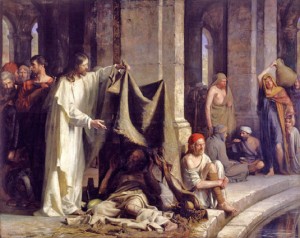From the Gospel of John:
Now in Jerusalem by the Sheep Gate there is a pool, called in Hebrew Beth-zatha, which has five porticoes. In these lay many invalids – blind, lame, and paralysed. One man was there who had been ill for thirty-eight years. When Jesus saw him lying there and knew that he had been there a long time, he said to him, “Do you want to be made well?” The sick man answered him, “Sir, I have no one to put me into the pool when the water is stirred up; and while I am making my way, someone else steps down ahead of me.” Jesus said to him, “Stand up, take your mat and walk.” At once the man was made well, and he took up his mat and began to walk.
(From the Daily Office Lectionary – John 5:2-9 (NRSV) – January 9, 2013.)
 This is an old and familiar story, this tale of Christ healing the paralyzed man a the pool at Bethesda. We all know it well. The story continues with a confrontation between the man who has been and the Jewish religious authorities. This healing took place on the Sabbath. The confrontation is over whether it is proper for the man to carry his mat (i.e., perform work) on the Sabbath. The man’s defense is that the person who healed him told him to do so, although he doesn’t know (at the time) who the healer was. Later he learns it was Jesus and identifies him to the priests and scribes.
This is an old and familiar story, this tale of Christ healing the paralyzed man a the pool at Bethesda. We all know it well. The story continues with a confrontation between the man who has been and the Jewish religious authorities. This healing took place on the Sabbath. The confrontation is over whether it is proper for the man to carry his mat (i.e., perform work) on the Sabbath. The man’s defense is that the person who healed him told him to do so, although he doesn’t know (at the time) who the healer was. Later he learns it was Jesus and identifies him to the priests and scribes.
So John’s point has to do with the Sabbath, the Law, and Jesus’ authority as Lord of the Sabbath. But I have always been fascinated by another very minor aspect of the story, and that is Jesus question to the man before the healing is performed: “Do you want to be made well?”
Our initial reaction to the question is probably to think, “Well, of course he does!” It seems a patently ridiculous question. But that betrays our own biases and our own context.
A paralyzed man who has “been ill for thirty-eight years” has probably been supporting himself by begging. If he were to be healed, that would end. He would have to find another way of making a living and, for a forty-year-old with no skills, that is going to be difficult. If he’s been lying there all those years, surely he could have gotten into the water and been healed, so if he wanted to be healed someone (like Jesus) could legitimately assume that he would have been. Since he hasn’t, perhaps he’s satisfied with his condition. So Jesus’ question is not ridiculous; it’s a legitimate, economic question Jesus is asking of this fellow.
And it’s more than that. What Jesus is really asking this man is, “Are you ready for everything to change?” I am often in conversation with people who wish (or, if they are religious sorts, pray) for some aspect of their lives to be different. It may the healing of an illness, chronic or acute, for themselves or another, but it may also be for a new job, a change in their marital situation, an improvement in their financial condition. In counseling such folks, I think about Jesus’ question of the man at Bethesda: “Do you wish to be healed? Are you ready for everything to change?” Because we can’t just have change in one aspect or detail of our lives. Our lives are integrated; what happens in one area of life affects all others. Life cannot be compartmentalized. If our job changes, everything changes. If our marriage changes, everything changes. If our health changes, everything changes.
Do you wish to be healed? Do you wish for something in your life to be improved? Are you ready for everything to change?
====================
A request to my readers: I’m trying to build the readership of this blog and I’d very much appreciate your help in doing so. If you find something here that is of value, please share it with others. If you are on Facebook, “like” the posts on your page so others can see them. If you are following me on Twitter, please “retweet” the notices of these meditations. If you have a blog of your own, please include mine in your links (a favor I will gladly reciprocate). Many thanks!
====================
Father Funston is the rector of St. Paul’s Episcopal Church, Medina, Ohio.



Leave a Reply